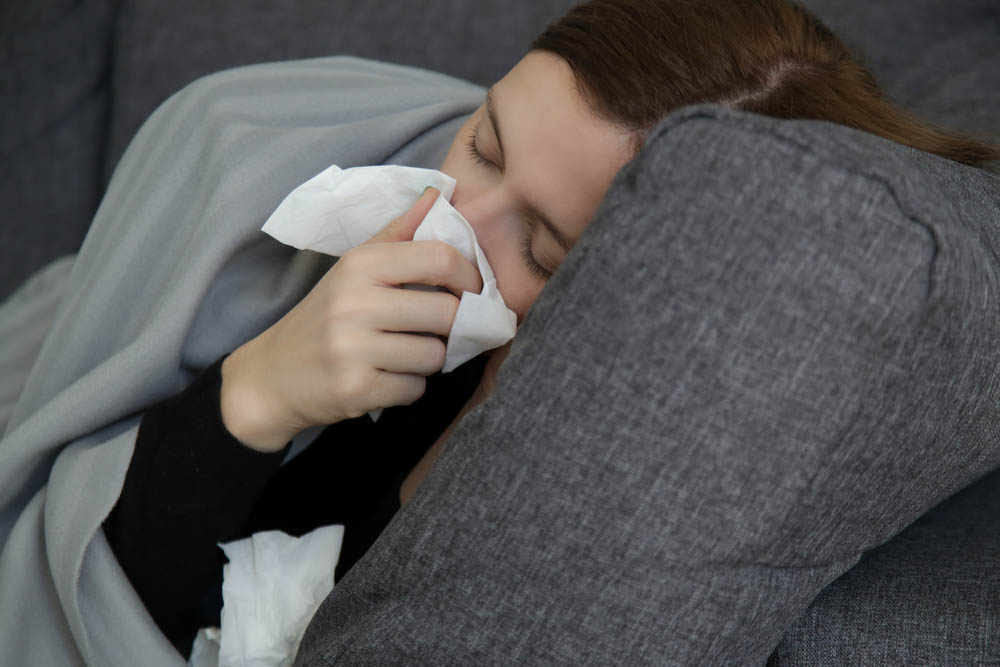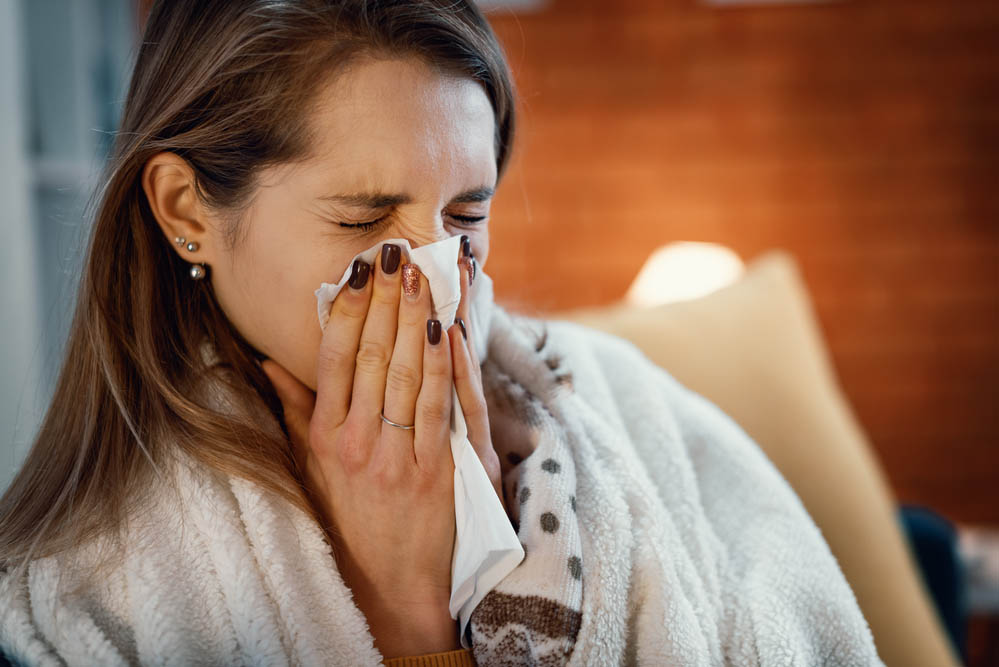While fever, cough, and shortness of breath have been widely recognized as common signs of COVID-19, what about sneezing?
Is it a symptom?
No, sneezing isn’t currently recognized as a symptom or an active indicator of COVID-19.
While sneezing is a common symptom of other respiratory illnesses such as the common cold or allergies, it’s not considered a specific indicator of COVID-19.
The primary symptoms associated with COVID-19 are:
- Fever
- Cough
- Shortness of breath
These symptoms are often accompanied by:
- Fatigue
- Body aches
- Sore throat
- Loss of taste or smell
If you’re experiencing sneezing alongside these symptoms, consult with a healthcare professional for proper evaluation and guidance.
Why does sneezing happen?
The act of sneezing is a reflexive response triggered by various irritants or stimuli.
Sneezing is your body’s way of clearing the nasal passages and expelling foreign particles or irritants, including the following:
- Dust
- Pollen
- Germs
When these irritants enter your nasal cavity, your body’s immune system responds by stimulating the trigeminal nerve, which then sends signals to the brain. This triggers a series of actions, including the contraction of muscles in the chest, throat and face, and the sudden expulsion of air through the nose and mouth.
Sneezing serves as a protective mechanism for the respiratory system. It helps to remove potentially harmful substances from the nasal passages and prevent them from reaching the lungs.
Sneezing can also be a response to:
- Allergies
- Colds
- Respiratory infections
In these cases, your immune system reacts to harmless substances or viral particles, which causes inflammation and increases mucus production, leading to sneezing.
When could sneezing be a sign of COVID-19?
While cough and fever are more commonly associated with the disease, sneezing can also be a sign of COVID-19 in some cases.
Sneezing alone isn’t enough to confirm a COVID-19 diagnosis, as it can be caused by various other factors.
So, when sneezing is accompanied by other symptoms, it’s advisable to seek medical attention and get tested for COVID-19. This is especially important if you’ve been in close contact with someone who has tested positive for the virus or has recently traveled to an area with a high number of cases.
COVID-19 symptoms can also vary from person to person, and some may experience mild or atypical symptoms. That said, stay informed about the latest updates and guidelines provided by health authorities, and consult a healthcare professional if there are any concerns about potential COVID-19 symptoms.

How to protect others if you are sneezing
Regardless of the cause of your sneezing, take necessary precautions to protect others from potential exposure to any respiratory droplets that may be released during a sneeze.
Always cover your mouth and nose with a tissue or your elbow when you feel a sneeze coming on. This helps to prevent the spread of any droplets that may contain the virus. Remember to dispose of the tissue properly and immediately wash your hands with soap and water for at least 20 seconds.
If you don’t have a tissue or elbow available, sneeze into the inner part of your shirt sleeve rather than your hands.
Avoid touching your face or surfaces after sneezing, as this can further spread any potential germs.
If you’re experiencing sneezing episodes, maintain a safe distance from others.
Lastly, if you’re frequently sneezing or experiencing other symptoms, it’s advisable to stay at home and seek medical advice.
By taking these precautions and being mindful of others, you can help protect those around you from potential exposure to respiratory droplets.
Treatment of sneezing
Since sneezing can be caused by various factors, there are different ways to treat it.
One common treatment for sneezing is over-the-counter antihistamines. These medications can help reduce sneezing by blocking the release of histamines, which are chemicals that trigger allergy symptoms.
Nasal saline sprays or rinses can also provide relief for sneezing. These products help flush out irritants and allergens from the nasal passages, which reduces the frequency of sneezing.
If you prefer this, make sure that you use sterile saline solutions and follow the instructions provided by the manufacturer.
Aside from these treatments, learn to practice good hygiene to prevent the spread of any respiratory infections, including COVID-19.
When to contact a doctor
Seek medical attention if you experience:
- Persistent or worsening sneezing symptoms
- Sneezing with COVID-19 symptoms
- Sneezing that interferes with your daily life
While sneezing alone may not be a definitive sign of COVID-19, it’s always better to err on the side of caution and consult with a healthcare professional. They will evaluate your symptoms, conduct a thorough examination and provide appropriate guidance.
Key takeaway
Sneezing isn’t a primary COVID-19 symptom, but if it’s accompanied by other symptoms such as fever, cough and loss of taste or smell, it’s advisable to get tested to know your infection status.
People with COVID-19 can still experience sneezing, especially if they have allergies or other respiratory conditions.




















































